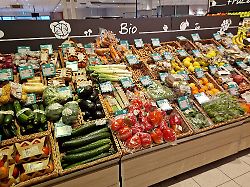Organic sales grow by 2.8 percent
The organic market is recovering from the price shock
December 29, 2023, 8:58 a.m
Listen to article
This audio version was artificially generated. More info | Send feedback
When it comes to tomatoes, apples or eggs, many consumers like to go organic – but in times of rising prices, the market for sustainably produced products also fell into a weak phase. Now there are signs of recovery.
The organic food business suffered during the period of high inflation – but according to industry sources, things are now looking up again. “Organic sales will consolidate in 2023,” says a market report from the German Farmers’ Association. According to data from the market research company GfK, sales of fresh products grew by 2.8 percent by October. The range of packaged goods is also likely to have been in positive territory.
“German organic food sales would grow towards 16 billion euros in 2023.” The large retail chains and the price play a more important role. The organic business, which has been weak at times, could get back on track pretty quickly. “Growing sales can be expected for 2024,” says the market report at the turn of the year. All major food retail chains have made a name for themselves with organic ranges. In 2022, the organic market in Germany, which is accustomed to success, recorded a loss. According to the Federal Organic Food Industry, sales fell by 3.5 percent to 15.3 billion euros.
The “eco sales winners” are the discounters
Politicians are also focusing on a faster expansion of organic agriculture – and this depends on continued growing demand. The coalition’s stated goal is to expand the organic share to 30 percent of the total agricultural area by 2030. Most recently it had risen further – but only slightly to 11.2 percent as of the end of 2022. 14.2 percent of all farms now work organically.
The focus is also on how robust organic proves to be as a business model. In the first year of the corona pandemic in 2020, when many people cooked at home, sales jumped by 22 percent to 15 billion euros and grew even further to 15.9 billion euros in 2021. In 2022 there was an unusual setback. Despite the return of many people to restaurants and canteens, where there is usually no organic offering, organic sales were still “largely” able to maintain sales, explained the Federation of Organic Food Industry.
However, organic products, which usually cost a little more, were also affected by a reluctance to buy more expensive foods in times of high inflation – with a strong trend towards buying in supermarkets, while specialist shops were left behind. The discounters were once again the “eco sales winners,” according to the farmers’ association report.
“Nobody has to switch to organic”
However, the Federal Association of Natural Foods Natural Products recently reported that the initially low demand increased in the second half of 2023. Since June there have been consistently higher sales figures than in the same month last year. Agriculture Minister Cem Özdemir (Greens) has presented a strategy for his department that is intended to boost organic sales. The focus is, for example, on increased organic research in order to increase yields from organic farming. Consumers should also be informed more precisely about organic benefits for environmental and animal protection.
One lever should be more organic food in canteens, cafeterias and restaurants. So that you can see at a glance how “organic” a kitchen is, providers can voluntarily use a round logo in the medal colors and advertise themselves in this way. It shows the organic share measured against the monetary value of the entire purchase. For gold it has to be 90 to 100 percent organic, for silver 50 to 89 percent and for bronze 20 to 49 percent. According to the ministry, the logos can be attached if companies are certified – the company’s own canteen in Bonn and that of the Ministry of Labor in Berlin already have a logo in bronze.
In order to be more organic, it is also important that more farms take part. Özdemir emphasized when he presented his strategy in mid-November: “Nobody has to switch to organic.” It is an option. However, the mood in the entire industry has been at a low point since the government coalition’s plans were announced to abolish two benefits in order to save money: the regulations on agricultural diesel and the vehicle tax exemption for agricultural vehicles. Özdemir kept his distance. However, the farmers’ association warns in the market report that the subdued economic prospects threaten to worsen further. There were also sharp protests from organic producers.
